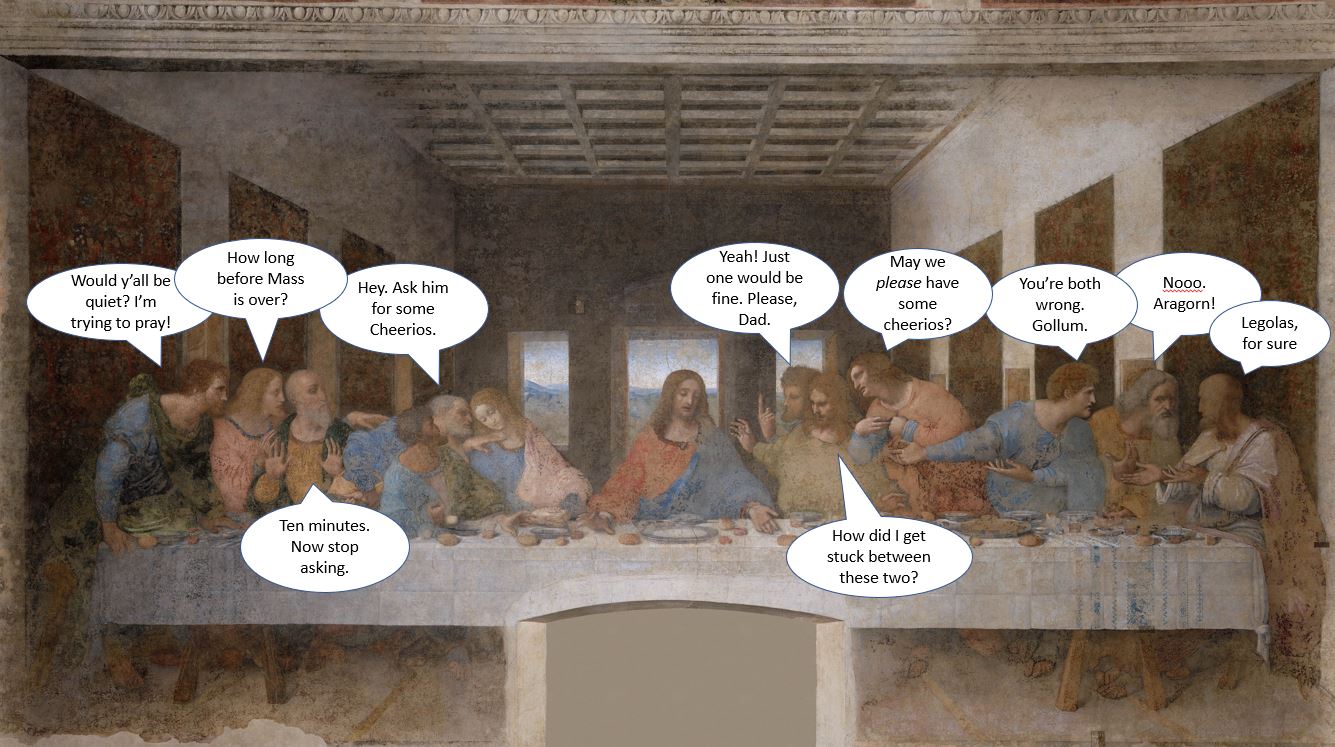Don’t mind me while I distract myself with a follow up to a post which supplanted what should have been a follow-up to a different post. I’ll get back there eventually, but for now I’ll just keep the wheels moving.
Perhaps the biggest challenge I’ve encountered in my life is overcoming my own inertia. I’ll peel back the curtain here: I’m an introverted melancholic. As I type that out, I wonder if there are any extroverted melancholics. What might that look like? Anyway…
Considering the Saints, those great dead heroes of the Catholic faith, I think they must have worked hard at letting difficulty roll off their backs. They embraced their divine filiation. That’s tough! But that’s the goal. If I can really trust that I’m a child of God, that the big guy has my back through thick and thin, what do I have to fret? Sanctity isn’t for the dead. I can find it in all the little circumstances of my day.
Practically speaking when it comes to being a man of God at the service of his family, what are those little circumstances? In the last post, I talked about the following Don’ts:
- Don’t think that way you say or do is better.
- Don’t always want to get your own way.
- Don’t argue when you’re wrong or stubbornly insist when you’re right.
- Don’t give your opinion if not asked for it when charity does not demand that you do so.
- Don’t despite the point of view of others.
- Don’t forget your gifts and good qualities are on loan.
- Don’t forget that you are unworthy of esteem (which had a host of other Don’ts under there).
For some, Catholicism has a reputation of being stodgy. All work and no play. Full of rules and devoid of life. Well, we know better (even if I am about to apply more).
So, don’t do this; don’t do that. What can I do? Sit in my room all day? Turn on some Gregorian Chant, light some incense, and dive into the Summa?
I suppose you could, but I don’t think that’d be particularly fruitful, Dad. It wouldn’t be for me anyway. Your mileage may vary. Rules and restrictions are meant to guide the formation of good behaviors. At least that’s what I tell myself when I utter the word “no” for what feels like the eight-hundredth time to one of my children.
What really works for our family is when my kids see me (and to a lesser extent my wife) make joyful sacrifices. When my nine-year-old sees that I can control my temper in difficult situations, or serve myself last, or ask lots and lots of smiling questions of our guests – she learns, “Oh… so that’s how I’m supposed to behave.”
On the flipside, when she sees Dad helping himself to his third popsicle but didn’t finish his dinner, or when I blow up over what amounts to practically nothing, what’s her reaction?
“Oh… so that’s how I’m supposed to behave.”
“Wait… did he say ‘to a lesser extent his wife’ when talking about parental example?”
Yeah. I did. There’s plenty of evidence to suggest that you, Dad, are a bigger factor in your child’s long-term health, happiness, success, and fidelity. No pressure. As an aside, loving children doesn’t have to be so complicated. Even the occasional (or in my case often) misstep can be fertile ground for reconnecting with your children. Let them see how you’re at least trying conquer yourself for their sake.
That’s why I have these reminders; I want to learn how to consistently act with charity. I want to be “without inertia,” as a priest friend of mine said the other day: to have no resistance to a sudden change, and to bear it joyfully. If I’m neck deep in a teleconference or e-mails or even writing one of these posts and a child comes up asking for popcorn, to have their button wiped, or to play with trains (perhaps all three), if I have no inertia, I can easily look up, smile, listen, and give them a little bit of my time.
Let’s continue then…
Don’t Mention Yourself as an Example Unless it’s About a Hard Lesson You Learned
This is different from the natural inflation we should strive for as a father. I want my kids to see that I’m a confident, self-assured individual. I want them to know that when I go to work, it’s a choice. When I undertake a project, I do so with the intention of completing it and doing it to the best of my ability (whatever the end result may be as a consequence of inferior ability). Finally, when the job is done or the game is won, where does the credit go? It goes to God, and all those who enabled me.
What I don’t want is for them to see, or perhaps feel, a bunch of hot air: a dad who talks a big game, but chooses not to back it up. A dad who, like the unforgiving servant, has dangerously little self awareness.
“Confession is important! You should go weekly!” Well, why don’t you, Dad?
“Mass is important! You’re there to spend time with the King of the Universe!” Well, why do we rush out every Sunday, Dad?
“Treat your siblings with the respect they deserve!” Well, why do you yell at Mommy, Dad?
I’m sure you can think of countless others. To take it a step further, what good is my boasting if it seemingly comes at the expense of another’s failures? Perhaps in a well-meaning way, we cite ourselves as an example for others to follow: I was successful because I did X. You should do X, too. Perhaps the implication is that not doing X will make you less successful.
Most of all, however, it’s an exercise in humility – a virtue which is centered on everyone else but us. In other words, humility allows us to magnify the greatness in others. How wonderful a gift this is for those we interact with – most especially our wives and children.
Don’t speak badly about yourself that others may contradict you.
Back in my day, we just called this “fishing for compliments,” and it was usually a girl on a date with a boy. “Oh I think my hair must be all frizzy.” “Nonsense! It looks great!” (As if he had any other options to respond with)
It’s the same concept here, and it just makes me look weaker than I really am. A little self-deprecating humor is fine, especially if you are not the originator. Say your wife takes a jab at your punctuality. No problem. “Yeah, if I went any slower, I’d be going backwards.”
Even acknowledging failures in an honest way is just fine. When I make a mistake at work, I’m unabashedly quick to admit it. I’m no saint, and I don’t mean to break the rule prior to this one either. I simply don’t want to deal with someone else finding my mistake before I do. Sounds a lot like pride.
My problems arise when I’m already feeling glum, and I give in to the temptation of voicing my gloomy attitude to others. Almost as a self-defense mechanism, a positive person will seek to right my ship for me. “Don’t be ridiculous! You’re not stupid for thinking the Grand Canyon was in Montana! In fact, you’re one of the smartest people I know.”
The statement saying I’m one of the smartest people they know isn’t even related to my geographical misunderstanding. Knowing where the Grand Canyon is no indicator of my overall intelligence (note that this is antithetical to a lot of modern thinking which tends to tie intelligence to information while disregarding formation – just look at social media and the 24-hour news cycle).
So let’s not put our family, friends, and co-workers in the position of re-building our self-esteem. I’m in charge of having a good day, not them.
(One little caveat to this rule: If someone is abandoning themselves to this sort of behavior, I’ve found it’s generally good to give them a little pick-me-up while pointing to counter-examples of whatever statement they’re making. If it’s about appearance, well, that’s trickier…)
Don’t make excuses when you screw up.
But it can be so easy! I’m late to a meeting: “Sorry y’all! Just a little hiccup with getting the kids ready this morning.” What am I conveying? What thought have I just put into my co-workers’ heads? That kids derail the normal function of an adult’s life. Is that what I really want to communicate?
Other excuses that sound perfectly legitimate and are generally always excused:
“It has just been so busy around here lately.”
“I ran out of time.”
“I bit off more than I could chew.”
“The supplier didn’t get me the widget on time.”
The problem with excuses is that they are almost always offered without solicitation. If I roll into a meeting late, a curt, “Sorry folks,” should be enough. If I’m pressed later (especially by a manager), it seems best if I simply tell them the reason I didn’t show up on time, not the reason my kids or wife or the traffic prevented me from being on time. “I didn’t leave early enough to get here on time.” If it’s still not enough information, then I can still protect the innocent while taking ownership, “I wanted to make sure my family was set up for success before I got in the car for work.”
Of course, you save a lot of time and face if you just throw someone or something else under the bus, and when that someone/something is mutually exclusive from the environment (i.e. your wife who never sees your coworkers), what’s the harm? Perhaps it’s greater than we realize.
Now, look – sometimes excuses are justified. An excuse is just a reason for something happening. If you get in a car accident and miss a meeting, you’ve got a legitimate excuse. It’s the illegitimate (or uncharitable) excuses we need to guard against.
Don’t Hide Your Faults to Protect Someone’s Perception of You
This has the same flavor as the previous, so I won’t spend much time with it. In my opinion, it differs in one key area: while the previous rule tends to govern superficial or temporal deficiencies, this rule concerns itself with deeper, character-based deficiencies. An example might be obscuring or generalizing truths in spiritual direction or confession (a lack of specificity in an attempt to dampen the blow of the offense). Rather than saying, “I have spent four hours every night for the past two weeks playing video games while my wife handles dinner, bedtime, and cleanup of the home,” we say, “I’ve struggled with laziness.”
We forget that we can’t hide anything from God. Nothing. Sorry, Dad. I’m in the same boat as you. How clever am I that I tell a half-truth to my wife? God knows the full of it, and He’s the one I should really be concerned about.
Don’t Refuse to Carry Out Menial Tasks
I suffer from a disordered attachment to responsibility, and then a disordered understanding of responsibility. So I suppose I have a disordered attachment to a disordered understanding. I suppose in some blessed world these two disorders may annihilate themselves, but I’m afraid in this particular case they only exacerbate each other.
My disordered understanding of responsibility is this: something which is not just worthy of my attention, but also worthy of esteem. A noble endeavor. A visible effort. A respected position. Noble and respected by whom? By my peers. What a rough expectation.
Coupled with that disordered understanding, I pursue it doggedly at times. Here I am writing a blog – mostly in an effort to get all these thoughts out of my head, but also because I think those thoughts may be of benefit to someone… somewhere. I seek out a big opportunity to make a big difference and often miss a lot of minor opportunities to make small differences. I swing for the fences instead of playing small ball.
But a father, and a leader in general, doesn’t shy away from doing the mundane or dirty jobs. He gets his hands in there – whether it’s a plumbing issue, hurt feelings, brushing hair, wiping down car seats, changing diapers in the middle of the night, what have you. All those little acts accumulate quickly and make the lives of your wife and children that much easier. If not you, then who?
Don’t Be Ashamed of not Having Certain Possessions, Qualities, or Achievements
I am not the sum of my things. Having a nice shirt may help me feel more confident, but my greatest confidence comes in knowing that I’m a child of God (or at least I want it to be – still working on that to be honest).
My wife and I drive fairly old cars (a 12-year-old minivan and an 18-year-old SUV). We shop at Aldi. Jason’s Deli is our favorite date night haunt. We buy the majority of our books used. Our clothes are almost always secondhand, though I did recently pick up a few clearance items from Jos. A. Bank.
We have friends we find marvelously talented who are inspirations to us in terms of their marriages and parenting styles. I wish I had the photographic memory of a buddy of mine who can read anything and seemingly remember it with total clarity. I long for the attention to detail of my co-workers. I read successful authors and think, “Maybe that’ll be me some day.”
But what am I doing to mind the gap here? Am I setting up an ideal version of Jonathon which is not in God’s plan? Maybe I am. It could be that those talents, gifts, or blessings weren’t given to me because if they had been, maybe I’d struggle with… pride, gluttony, greed, etc.
Or rather, I’d struggle more!
And while I do target certain achievements and wish to cultivate or enhance certain qualities, I’m 37. I’m not old, but my spring chicken days are over. At this point, I’m refining. Latent talents or desires now need to put up, or shut up. With five children, I find myself pushing away old, childish ambitions (and they were childish – maybe that’ll be a subject for another time). Now is the time for me to see my worth – maybe buried in the muck somewhere because I’ve forgotten – and do something with it.
Perhaps that something is no grander than raising 5+ kids to successful adults. If so, great! Perhaps it’s something different, or in addition. Regardless, there’s a call out to all of us, and it’s best if we respond as quickly and as eagerly as we can without allowing that dumb devil to barge in. He wants to confuse and distract, and modern society is rife with people bereft of purpose as a result.
Say it with me: Not today, Satan.






